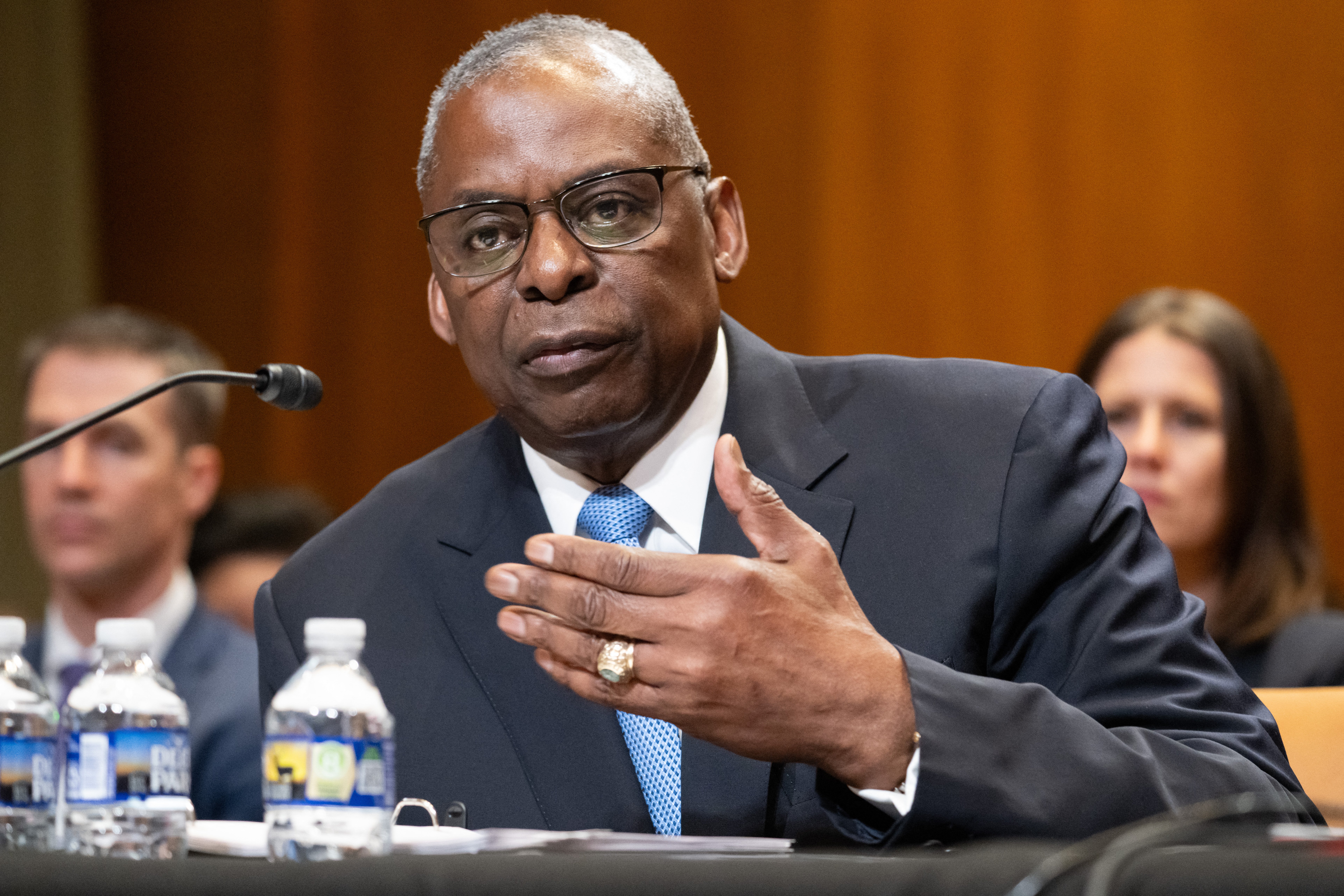
WASHINGTON – Defense Secretary Lloyd Austin confirmed Wednesday the Pentagon has “paused” one weapons shipment to Israel, but claimed the US had not made a “final decision” on the materiel, angering – and baffling – Senate Republicans.
“We did pause as we re-evaluated some of the security assistance that we’re providing,” Austin told members of the Senate Appropriations Subcommittee on Defense during a hearing that was repeatedly interrupted by anti-Israel protesters.
“As we have assessed the situation,” Austin went on, “we paused one shipment of high-payload munitions.”
The Pentagon leader said the administration halted the delivery of precision bombs in response to Israel’s offensive targeting Rafah, Hamas’ last stronghold in the Gaza Strip.
The news was poorly received by Republicans on the subcommittee, including Sen. Lindsey Graham (R-SC).
“If we stop weapons necessary to destroy the enemies of the state of Israel at a time of great peril, we will pay a price,” he said. “This is obscene; it is absurd. Give Israel what they need to fight the war they can’t afford to lose – this is Hiroshima and Nagasaki on steroids.”
“It was not the Israelis that started this conflict,” agreed Sen. Susan Collins (R-Maine). “And I’m very concerned that we not try to micromanage Israel’s right to defend itself against a terrorist group backed by Iran.”
Fumbling for words
Austin’s admission came after a series of Biden lackeys – from White House press secretary Karine Jean-Pierre to deputy Pentagon spokeswoman Sabrina Singh – for days refused to confirm or deny media reports that the aid had been stopped.
But after copping to pausing the shipment, the defense secretary backpedaled, cautioning the committee that the administration had not yet made an official determination whether or when Israel would receive the package.
“Again, we’ve not made a final determination on how to proceed with that shipment,” he said. “And I would highlight that this shipment doesn’t have anything to do with the supplemental appropriations that you just helped us get.“
A confused Sen. Shelly Moore Capito (R-WV,) asked Austin point-blank whether the reports of the halted aid were false.
“No, we are currently reviewing some near-term security assistance shipments in the context of the
unfolding events in Rafah,” he replied.
“So we are withholding our shipments of weapons predicated on the strategy that Israel’s employing and going into Rafah?” Capito asked. “Is that the bottom line here?”
“We’ve not, again, we’re assessing, we have not made any final decisions on this yet,” Austin told Capito, fumbling for words. “But, but to answer your question, yes, we are. There are some things that we’re taking a closer look at.”
“OK, that that’s an answer,” said a visibly annoyed Capito, who went on to voice her disapproval of the pause.
Deterring “regional conflict“
The decision to halt the aid aligns with the Biden administration’s repeated demands that Israel wait to launch its assault until the roughly 1 million Palestinian civilians in Rafah can leave or otherwise be protected.
“We wanted to make sure that we saw a plan to move those civilians out of the battle space before executing any kind of ground combat operation,” Austin told Collins at one point.
“I think we’ve also been very clear about the steps that we’d like to see that Israel take to account for and take care of those civilians before major combat takes place,” he also told the panel. “We certainly would like to see no major combat take place in Rafah, but certainly, our focus is on making sure that we protect the civilians.”
Several Republicans on the committee, such as Sen. Jerry Moran (R-Kan.), questioned the sensibility of tying weapons shipments to Israel’s military policy.
“We should not be signaling to Iran’s enemies that our support is conditional,” he said. “Many of us in this room worked hard to get aid included and passed by the House and Senate in the emergency supplemental [to fund Israel.]”
Meanwhile, Capito pressed Austin on what the administration is doing to “establish a stronger, more critical, credible deterrence against these threats from our adversaries,” citing concerns over Biden’s approach of telling Iran and other outside actors “don’t” broaden the conflict.
“When I see President Biden’s messaging to [Vladimir] Putin and Iran and to the Houthis and other Iran-backed groups, I just see President Biden saying, ‘Don’t,’” she said. “… I’m concerned that we are significantly eroding our deterrence by setting these sort of ambiguous boundaries and letting our adversaries kind of walk over sometimes.”
Austin cited the decision to move more US troops into the region – including deploying several aircraft carriers to the surrounding waters – as proof of the administration’s actionable deterrence and claimed the conflict had not spread beyond Gaza despite early attacks on US bases in the Middle East and tit-for-tat strikes between Iran and Israel last month.
“Even though there’s been dustups throughout the region, we don’t see a regional conflict at this point,” he said. “… But in terms of Iran and its actions in the region, Iran continues to present a a threat to the region. And that’s something that we’re going to have to remain focused on for sure.”
“My final comment,” he added, “is that we are absolutely committed to continuing to support Israel in its in its right to defend itself.”














